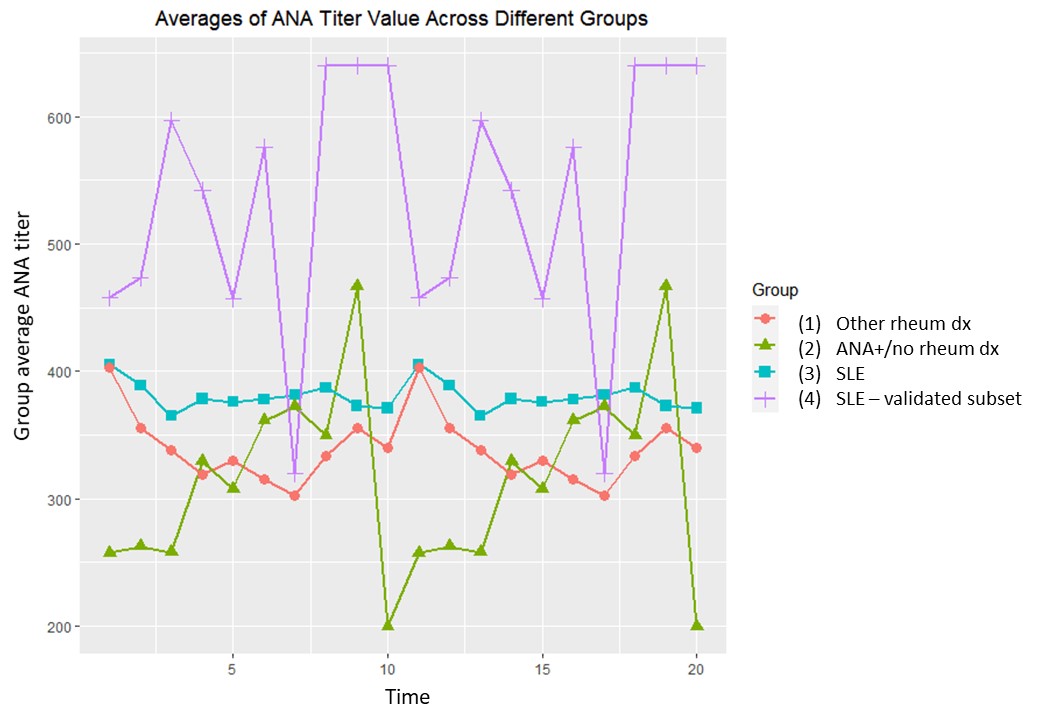Session Information
Date: Saturday, November 6, 2021
Title: SLE – Diagnosis, Manifestations, & Outcomes Poster I: Diagnosis (0323–0356)
Session Type: Poster Session A
Session Time: 8:30AM-10:30AM
Background/Purpose: Antinuclear or anticellular antibodies (ANAs), are a hallmark of systemic lupus erythematosus (SLE). ANAs are also a marker of subclinical autoimmunity, with ~13% of the general adult population ANA+. Risk factors for developing subclinical autoimmunity are poorly understood. An important step is to understand trajectories of ANA positivity and titers within individuals over time. We performed an exploratory analysis of electronic health record (EHR) data to assess intraindividual variation in ANAs longitudinally.
Methods: Utilizing our academic health center’s EHR we formed a sub-cohort of all patients with at least 2 ANA tests (by immunofluorescence, IFA). A titer of ≥1:80 was considered positive. We evaluated the effect of time on the titer value using a longitudinal random effect model comparing across different patient groups defined by ICD codes: (1) ANA-associated rheumatic diseases (Sjogren’s Syndrome, dermatomyositis, polymyositis, scleroderma, undifferentiated connective tissue disease, mixed connective tissue disease); (2) ANA+ controls without rheumatic disease; (3) SLE. A subset of SLE was validated by a rheumatologist and fulfilled ACR/SLICC criteria (4).
Results: 7226 patients had at least two valid ANA-IFA lab results (SLE by ICD n=1706, validated SLE n=54, alternate rheumatic diagnosis n=1644, ANA+/no rheumatic diagnosis n=3822). Of 5603 patients with a positive ANA at the first observation, 4 (7%) of SLE and 953 (17.2%) of non-SLE and had a subsequent negative ANA. Longitudinally, the strength of ANA titer changed over time (p< 0.001) among both SLE and non-SLE patients. Controlling for time, SLE patients had a higher odds of a positive ANA titer on average vs non-SLE [OR 1.44, 95% CI (1.19, 1.75)]. SLE patients also had a higher odds ratio on average of a positive ANA titer associated with time change compared to non-SLE [ratio of OR overtime 1.09, 95% CI (1.02, 1.17), p< 0.001].
Conclusion: While previous cross-sectional data have shown that ANAs tend to increase with age, longitudinal data of intra-individual patterns are lacking. Our data provide initial evidence of intra-individual variability over time, with SLE patients having increasing titers over time. Future work includes investigating demographic and other covariates to discern titers in SLE and non-SLE ANA+ clinical phenotypes. We seek to determine if pre-clinical (or subclinical) periods are opportunities for intervention to modify the course of autoimmunity and clinical progression.
To cite this abstract in AMA style:
Littlejohn E, Kong L, Speth K, Wang L, Somers E. Longitudinal ANA Titers in SLE and ANA+ Controls [abstract]. Arthritis Rheumatol. 2021; 73 (suppl 9). https://acrabstracts.org/abstract/longitudinal-ana-titers-in-sle-and-ana-controls/. Accessed .« Back to ACR Convergence 2021
ACR Meeting Abstracts - https://acrabstracts.org/abstract/longitudinal-ana-titers-in-sle-and-ana-controls/

